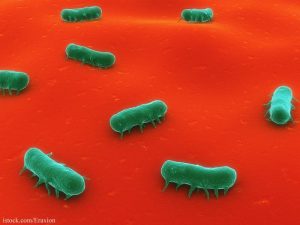The Centers for Disease Control and Prevention (CDC) has issued advice to consumers about the multidrug-resistant Salmonella outbreak linked to pork products in Washington state. As of August 13, 2015, 134 people are sick with the outbreak strain of the bacteria.
 Pork produced by Kapowsin Meats is the “likely source” of this outbreak. That facility has recalled 116,262 pounds of whole pigs that may be contaminated with Salmonella bacteria.
Pork produced by Kapowsin Meats is the “likely source” of this outbreak. That facility has recalled 116,262 pounds of whole pigs that may be contaminated with Salmonella bacteria.
If you purchased whole pigs and have stored them in your freezer, do not cook or eat them. The recalled products have the establishment number “Est. 1628” inside the USDA mark of inspection. Discard or return to the place of purchase for a refund.
It is difficult to roast a whole pig safely, since there are many potential food safety issues. Always keep the pig cold, at or below 40°F before cooking. Thaw the pig completely before cooking. Use a food thermometer to make sure the meat has reached an internal temperature of 145°F after 3 minutes rest time, checking at the center, the thickest part, and the surface of the meat. Color is not a reliable indicator of doneness.Discard any leftover meat that has been at room temperature for more than 2 hours.
CDC’s National Antimicrobial Resistance Monitoring System (NARMS) lab has conducted antibiotic resistance testing on bacteria isolated from three people who are sick with one of the outbreak strains. They found that 100% of them were multidrug resistant. This included resistance to ampicillin, streptomycin, sulfisoxazole, and tetracycline.
Antibiotic resistance is associated with increased risk of hospitalization in patients with bacterial infections. Those patients are also at high risk of developing bloodstream infections, or treatment failure.
The symptoms of a Salmonella infection include diarrhea that may be bloody, abdominal cramps, fever, nausea, chills, headache, muscle pains, and vomiting. The symptoms usually appear 12 to 72 hours after infection. Most people recover without medical treatment, but some become so ill they must be hospitalized. If you have experienced these symptoms and have eaten pork, please see your doctor as soon as possible.




